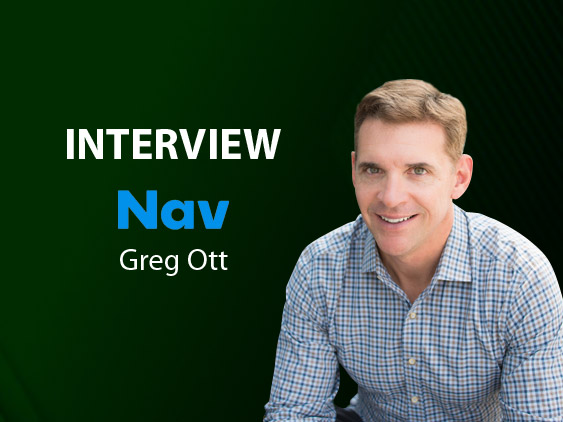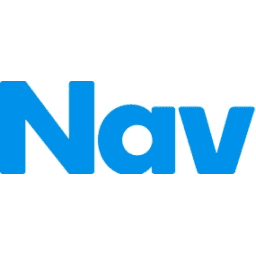The need-of-the-hour for global businesses today revolves around getting access to streamlined payment models and processes that facilitate more timely payments, according to Greg Ott, CEO of Nav. Catch this complete Global FinTech Series interview to read more on Greg’s thoughts when it comes to the evolving fintech segment and how data aggregators are changing the name of the game in fintech.
______
Hi Greg! Can you tell us a little about yourself and how you’ve seen the fintech segment evolve over the years?
I’ve always been fascinated with how data and technology can make our lives easier, and I’ve been fortunate enough to have spent my career working in forward-looking companies that value the importance of the two.
I’ve enjoyed watching fintech move more of our financial services online. We’re slowly transitioning the ways we interact with money: things, like paying bills and making financial decisions, is moving from the mailbox (or driving and parking, then waiting in line at the bank) to apps and email.
I think we’re going to see more big acquisitions by incumbent financial service providers. A lot of the larger companies aren’t built to be innovators; it’s a better path to acquire people who have been innovating.
I also think we will see more activity around fintech serving the small business and commercial industries. These always lag behind consumer-driven fintech, but I believe 2020 is the year those SMB solutions will start to emerge.
Can you talk about some of the most innovative fintech platforms that according to you have been game-changers for this niche in the recent years?
Data aggregators have been a game-changer. Some, like Yodlee, have been around for a while, but we’re also seeing newer players like Plaid and Finicity, who have enabled solutions to be built on top of financial data.
I’d say the most impactful have been those brands who have built a sandbox and allowed others to play in it for the greater good of the market.
What are some of the top tricks / tips you’d share with B2B businesses when they choose / adopt their fintech stack? What are some of the must-haves in a fintech app/platform for a typical B2B business, for instance?
Think about what you are trying to streamline and how comfortable you are letting the technology do it. For instance, you should never wonder what your upcoming expenses should be, and you should never wonder if you can get access to the capital you’ll need to run your business. You need financial technology solutions that show you a glimpse of the future, of which there are plenty.
That’s what we’re aiming to solve for at Nav: providing insight into a business’ financial well-being, as well as their best options for financing.
I’d say beyond that, some must-haves include an accounting solution, payment processing, bill pay, and digital access to capital.
Given the changing dynamics and changing needs of users/businesses from finance technology, how do you foresee the global payments industry shape up, what will be some of the key features that will become the need-of-the-hour with time?
The need-of-the-hour for businesses is getting paid. Businesses of every size worry about how they can get the people and companies that owe them money to pay them.
Global mobile payments solve that pain point. In the past, the compliance, tax, and even currency exchange processes weren’t worth the hassle for smaller businesses to deal with, but as those barriers come down, it opens a much broader set of business opportunities for companies.
Read More: GlobalFintechSeries Interview with Hamed Arbabi, CEO & Founder at VoPay
Given the changes in demands and changing needs of users from fintech, how has the Nav product evolved over the years to keep with changing trends?
There are more options than ever for small businesses to find capital. New lenders appear every day. Nav has been able to expand the number of lenders it filters through for SMBs to find the right match for financing. We can even include niche lenders that focus on, say, dentists or real estate.
Our product has also had to adapt to the fact that it’s hard for business owners to keep up with their cash situation. They tend to look for capital at the eleventh hour rather than in advance of that desperate need. We’re working to make it easy to help them be prepared ahead of when they need capital.
Tag (mention/write about) the one person in the fintech industry whose answers to these questions you would love to read!
I was going to say Ken Lin, but now I’m going to say Sasan K. Goodarzi!
Your favorite FinanceTech quote and top leadership advice that you’d like to share, given your expertise building teams in this space.
My advice: trust your teams and don’t take yourself too seriously.
A quote I like: “Technological innovations will be the heart and blood of the banking industry for many years to come and if big banks do not make the most of it, the new players from FinTech and large technology companies surely will.”
– David M Brear, Group CEO at 11:FS
Read More: GlobalFintechSeries Interview with Lil Roberts, CEO & Founder at Xendoo
Greg Ott is the CEO of Nav, a FinTech company that matches business owners with their best financing options for free. Greg has more than 20 years of experience as a leader within both startups and Fortune 500 corporations. Prior to Nav, he served as VP of Marketing for Intuit QuickBooks. Greg has built new organizations and transformed existing ones to be more nimble, innovative, and results-focused. He is an organizational and financial technology thought leader, frequent conference speaker, and contributor to Forbes, Entrepreneur, and other business publications.

